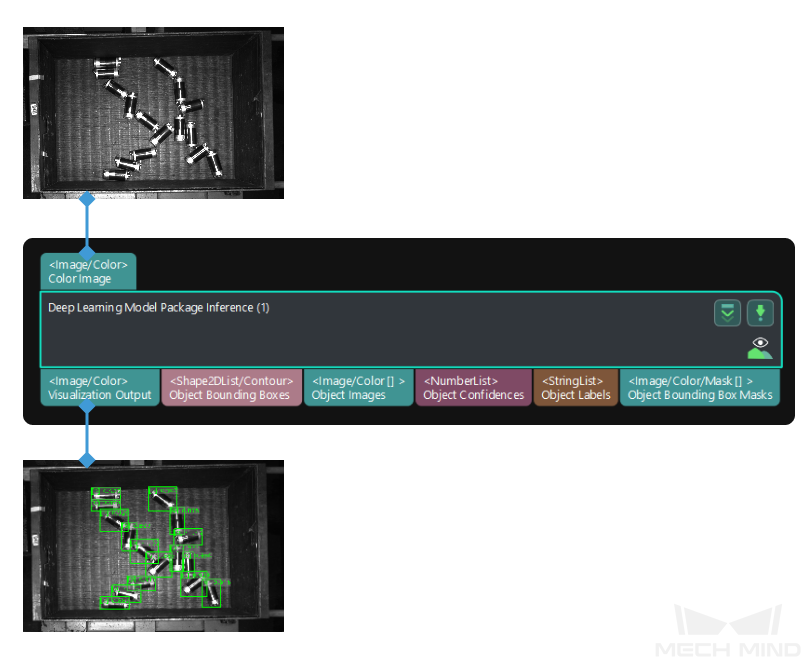Deep Learning Model Package Inference
|
From Mech-Vision 1.7.2, the Deep Learning Model Package CPU Inference and Deep Learning Model Package Inference (Mech-DLK 2.2.0+) Steps are merged into the Deep Learning Model Package Inference Step, which supports two deep learning model files exported from Mech-DLK with the suffixes being .dlkpackC and .dlkpack. Open the previous project with Mech-Vision 1.7.2, you can find the Deep Learning Model Package CPU Inference and Deep Learning Model Package Inference (Mech-DLK 2.2.0+) Steps are automatically replaced with the Deep Learning Model Package Inference Step. |
Function
This Step performs inference with single model packages and cascaded model packages exported from Mech-DLK and outputs the inference result.
Currently, this Step performs model package inference in seven scenarios: classification, object detection, defect segmentation, instance segmentation, text detection, text recognition, and unsupervised segmentation.
|
This Step only supports model packages exported from Mech-DLK 2.2.0 or above. |
|
From Mech-DLK 2.4.1, model packages can be divided into single model packages and cascaded model packages.
When this Step performs inference with cascaded model packages, the Deep Learning Result Parser Step can parse the exported result. |
Usage Scenario
This Step is usually used in classification, object detection, and defect segmentation scenarios. For a description of the compatibility of the Step, please refer to Compatibilities of Deep Learning Steps.
Input and Output
System Requirements
The following system requirements need to be met when using this Step.
-
CPU: needs to support the AVX2 instruction set and meets any of the following conditions:
-
IPC or PC without any discrete graphics card: Intel i5-12400 or higher.
-
IPC or PC with a discrete graphics card: Intel i7-6700 or higher, with the graphics card not lower than GeForce GTX 1660.
This Step has been thoroughly tested on Intel CPUs but has not been tested on AMD CPUs yet. Therefore, Intel CPUs are recommended.
-
-
GPU: GeForce GTX 1660 or above (if with a discrete graphics card).
Parameter Description
You can click the following links to check the corresponding parameter descriptions of each function.
|
When using this Step for inference with the cascaded model package, you can adjust the parameters in the next Step Deep Learning Result Parser. |

